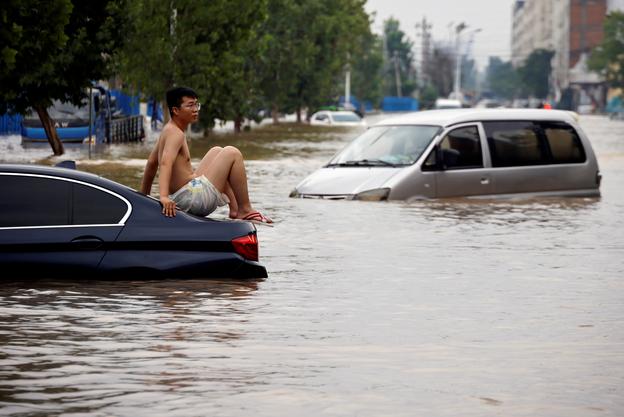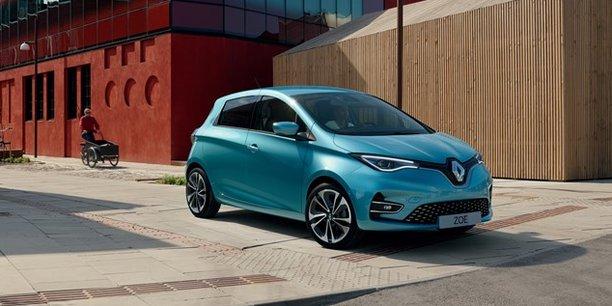Climate: “COP26 is too carbon-centric, water is the big forgotten”
LA TRIBUNE - The disruption of the water cycle is one of the main consequences of climate change. What place is reserved for the issue of water at COP26?
MARIE-HÉLÈNE AUBERT - With great astonishment, we see that water is not an issue that is sufficiently taken into account in the debates around the climate. There is indeed a water pavilion at COP26, bringing together several organisations, but this is the first time. And if a dozen UN organizations, headed by the World Meteorological Organization (WMO), have finally issued a declaration emphasizing that water must absolutely be integrated into programs for adapting to climate change, that is new. However, while we can do without fossil fuels, we cannot do without water, which is the source of all forms of life.
What are the reasons for this oversight?
One of the major difficulties in the international treatment of environmental issues lies in the organization of the international agenda by sectoral conventions. Three major conventions emerged from the Earth Summit held in Rio de Janeiro in 1992, each with its Conferences of the Parties (COP): one on climate, one on biodiversity, one on desertification. They evolve separately at their own paces, which hinders an effective treatment of climate issues, since all these subjects are linked.
In addition, the debate on the climate has so far mainly focused on the production of carbon via fossil fuels, and not enough on the interactions with other issues than energy production: food, water , forests, depollution... I think we have an approach that is too carbon-centric, where carbon reduction is the only obsession. It is also because, for some time, climate advocates have preferred to avoid focusing on climate change adaptation needs, fearing that this will disempower emissions mitigation. . But today, adaptation is recognized as a crucial and urgent issue. And in the face of climate change, there are a multitude of cross-cutting and interactive solutions, which should be better considered.
Before the Paris Agreement, in September 2015, the UN adopted a 2030 agenda with 17 sustainable development goals, of which water is one. But this objective has so far passed into the background, yet I think it should be the keystone of all environmental issues.
How can a better consideration of water in particular contribute to the fight against global warming?
An essential and often forgotten issue is the preservation of wetlands, on the coast or inland, which are carbon sinks, but also help preserve water resources in quantity and quality. Their surface throughout the world is shrinking due to the artificialization of soils.
We also often forget that the health of the oceans, the largest carbon sinks on the planet, depends on that of fresh water. It is therefore essential to take better care of the areas of estuaries and deltas, where large cities often arise and where billions of people live. Experts around the world are also working specifically on issues of access to water, pollution control, wastewater treatment, etc., in these crucial areas. In France and internationally, it is also important to review regulations and administrative organization, in order to better link the management of freshwater and marine areas, which are often separate.
Finally, if all the water stakeholders today take into account the impact of climate change on the large water cycle, whereas before the management of the small water cycle took precedence in their concerns , it is mainly approached in the form of risk management, floods and shortages. But to prevent these dangers, there are also changes to be made in agricultural and industrial practices as well as in domestic uses, which must become more sustainable and equitable. We must not forget that problems such as access to water or the treatment of waste water pre-exist the climate issue: the resulting work is all the more enormous.
What would you like?

The French Water Partnership (PFE) hopes that the subject of water will finally be placed at the top of the environmental agenda, and dealt with not only during COP26, but well beyond. We recommend tackling the climate issue as a whole and taking into account all its practical aspects, since the ecological transition goes far beyond the energy transition.
We should move from sectoral COPs to much more global COPs where, as the WMO declaration points out, water could play the role of "connector", since it is the element that links the whole environmental issues. It is also necessary to better apply the decisions taken at the global level to regional or even local scales, through platforms of actors carrying out precise and concrete projects. This would make it possible to better take into account extremely diverse situations and thus involve citizens more. Today's approach feeds a feeling of helplessness, whereas a local treatment linking all the issues would engender more confidence in the human capacity to trigger a real mutation, and would undoubtedly have a greater leverage effect important.
What are effective examples of concrete, local solutions?
In Brazil, in the State of Sao Paulo, the authorities of the municipality of Rio Claro (in the Piracicaba basin) have, for example, set up a system of payment for environmental services consisting in remunerating the local rural communities living upstream of the basin. for actions of reforestation, maintenance of banks, preservation of water catchments. This has enabled them to improve their income, open schools, create a dispensary, bring back the younger generations, while benefiting the water resources of the municipalities downstream. In France, the city of Roanne has chosen to manage its rainwater and avoid the congestion of the networks, which are very expensive to build and vulnerable in the event of flooding, by focusing on the restoration of natural parts of the territory capable of absorb rainwater and waterproofing. Examples of this type are found on all continents.
These solutions work, but must be managed differently from large infrastructure projects. They require an adaptation of monitoring, financial and regulatory tools.
What role can technology play?
The technological proliferation in terms of the sustainable management of water and aquatic environments is notable. In France, there is even a competitiveness cluster, Dream, located in Orléans, dedicated to this kind of innovation. But we cannot bet everything on this: we must also adopt a logic of global anticipation by valuing all the services that natural ecosystems offer us today. Small desalination plants that run on solar energy, for example, solve the problems linked to the use of fossil fuels, but not that linked to pollution.
As you have underlined, access to water is also often a source of conflict, which is likely to worsen with its scarcity. How to approach this aspect?
This is the reason why these issues can only be dealt with on a territorial basin scale and within the framework of representative assemblies bringing together all the concerns and interests. The management of water by large basin developed by France since the 1960s has had a following all over the world: each basin committee is crossed today by increasingly lively debates on this sharing of water. Such integrated management of water resources is the sine qua non for avoiding conflicts that can degenerate into real water wars.
Interview by Giulietta Gamberini
Giulietta Gamberini7 mins
Share :



